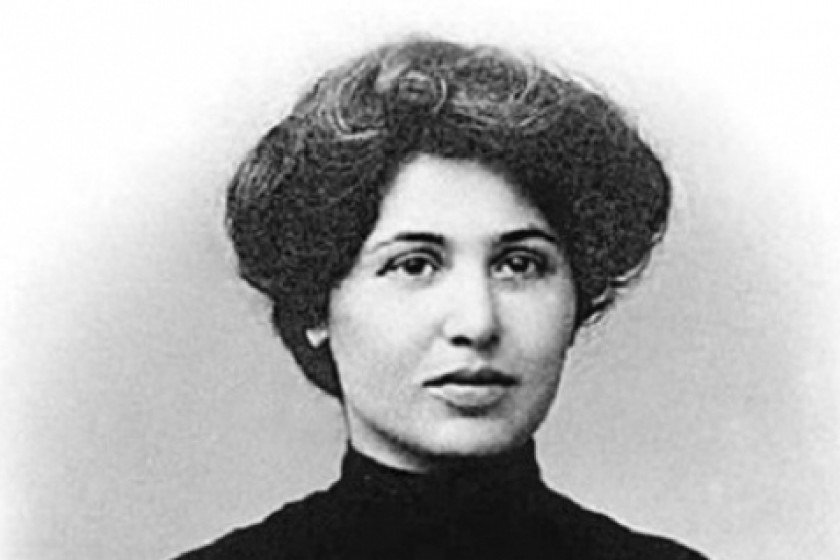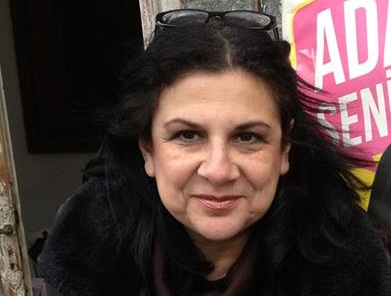
Istanbul-Armenian Kayuş Çalıkman Gavrilof: “The Turkish state always nurtures my pessimism”
Kayuş Çalıkman Gavrilof has translated Zabel Yesayan's "Among the Ruins" into Turkish. Book on Adana massacres now sold in Turkey.
The first Armenian documentarian, Zabel Yesayan's Among the Ruins (1911) was published in Turkish a month ago after being translated by Istanbul-Armenian Kayuş Çalıkman Gavrilof.
The book — now available in Turkish bookstores — tells the story of the massacre of Armenians in Cilicia in 1909, which occurred months after Turkey entered the Second Constitutional Era.
During that time, under the cover of the Constantinople Patriarchate, Yesayan visited Adana with the aim of establishing an orphanage. During the three months she stayed there, she described what she saw, including the families of victims of the massacre. She wrote letters to her husband about her emotions, asking him to keep the letters because "they might be needed." And in 1910, she wrote the book based on these letters of emotions and testimonies. The book was published a year later.
Many in Armenia don't know about Zabel Yesayan. Kayuş Çalıkman Gavrilof says the reason why is a question that needs to be raised in Armenia and that we have to face our history.
Çalıkman Gavrilof had put forth her mayoral candidacy in the local self-government elections in Turkey in March of this year. She ran as a member of Turkey’s Peoples’ Democracy Party (Halkların Demokratik Partisi, HDP for short). See “Istanbul Armenian Woman Sets Her Sights to be Mayor of Prince Islands”.
Among the Ruins (Turkish title: "Yıkıntılar Arasında") was printed by the publishing house Aras in Istanbul. Soon, the book will go through a second print run; according to Çalıkman Gavrilof, the first batch of books is almost depleted. It took her eight months to translate.
Why was the book translated with such a delay — 103 years later? Basically, there was no Turkish version until then.
 It's in the last 10–15 years that we've {Armenians in Turkey] begun to raise some noise in the country. The founding of an Armenian newspaper, Agos, was a sign of something changing in the status of the country. Then the women's rights platform was organized; after that, young people founded the platform Nor Zartonk ["New Awakening"]. Unfortunately and very unfortunately, Hrant Dink's death became an incentive for our people to stand up. Especially after Hrant Dink, the Turks began to show us support, establishing institutions. There came a time even when I was afraid, thinking we're returning to the days of the constitution adopted in 1908. You know, the first time with that constitution the Islam and non-Islamic segments [of the population] had to be equal before the state, but this was followed by the Adana massacre.
It's in the last 10–15 years that we've {Armenians in Turkey] begun to raise some noise in the country. The founding of an Armenian newspaper, Agos, was a sign of something changing in the status of the country. Then the women's rights platform was organized; after that, young people founded the platform Nor Zartonk ["New Awakening"]. Unfortunately and very unfortunately, Hrant Dink's death became an incentive for our people to stand up. Especially after Hrant Dink, the Turks began to show us support, establishing institutions. There came a time even when I was afraid, thinking we're returning to the days of the constitution adopted in 1908. You know, the first time with that constitution the Islam and non-Islamic segments [of the population] had to be equal before the state, but this was followed by the Adana massacre.
Is the book sold in Turkey's bookstores?
Yes, it is. Giving Armenians a voice, Hrant Dink's death, and certain segments of Turks and Kurds being with us ("We too are Armenian," they said on those days) is because of everything I've said. After that we began to collaborate with Kurds and Turks. This changed something in the governing segments of the country. In the past, we could see our books in our community, in our friends' bookstores, but now you can find Armenian books even in distant districts — or even in shopping malls, where you wouldn’t expect to see them. For example, I saw Zabel Yesayan's book in one of the big bookstores.
Things were different 5 years ago. You wouldn't find books describing the Armenian Genocide in Turkish bookstores. Was the wall broken?
A little bit.
That is, not completely?
No, absolutely not. At any given moment everything can turn back. That's why I said I compare these days to the days of the [second] constitution. That time too Armenians were enthusiastic; there was equality; we could speak and so on — now it's the same. We say, everything's changed, but in my mind I think it could be that which happened in 1909.
You said that some things have changed in Turkey: Armenians stood up on their feet, raised their voices… Is this a mask for Turkey to appear democratic, that it aspires to enter the European Union?
It started out that way, but now the government doesn't care. What happened? Democratic Turks, democratic Kurds entered a process that can no longer be stopped. Today, there are those in Turkey who think, yes, you did this to Armenians, now it has to be compensated for. Now these people have started a movement which is neither state nor governmental. Now, a part of the population is waging that battle, one which you view from outside the country.
Who is an Armenian in today's Turkey?
40,000–50,000 Christian Armenians; a few schools, churches, an inconsequential Patriarchate having a representative — this is the collective. Very, very few of these Armenians care or raise their voices — the rest think, "Let's not make a peep, stay and live in peace, it's good." They are Armenians who don't have an identity. Apart from these, there are more than 3–4 million Armenians in the state, even on Western Armenian [modern-day Eastern Turkey] lands. They are Islamicized Armenians.
You mean hidden Armenians?
Let's call them Islamicized Armenians and accept them like that. Thus, we can be side-by-side [with them] because until then we were apart. Hrant Dink's death was also the reason for us to get closer to each other. Those Armenians stood up too, saying that's enough.
The book was published in Turkish a month before April 24 [Armenian Genocide Remembrance Day]. What will it change in the Turkish reality?
That which I have to say now is not conditioned by politics. There can be a lot of things in the depths; for example, I read something in the past, and I knew that it was true because it was written by someone very credible to me, about where and how many Turks were massacred by Armenians. Immediately after reading this a need to rebel arose within me. Armenians didn't massacre Turks — Armenians waged a struggle. That was what arose in me. When I felt that need to respond, at that moment I understood the Turks' retort — not the government's, not the state, but an ordinary Turk's. A person may be kind and good, but when they see how their forefather murdered (skinned, raped, cut up, massacred) Armenians, that person rebels, saying no, the Turks can't do such a thing. Confrontation is very, very difficult with such a crime.
Will there be that confrontation?
There has to be. Though what I'm saying is wrong, but now the people accept it, that it's happened. Among this 70 million people, we are in collaboration with perhaps 1 million. There remains 69 million: we don't know what will and what won't happen. But as long as I've known the Turks, the state has to do it so that this issue of [genocide] recognition passes smoothly. The [Turkish] people are players: you can't trust [them] on a state level. He shows you that this is what he is, but he's the complete opposite. This is the general position.
Do you mean the Turkish authorities?
Yes, yes, the authorities. One of the reasons why there is an obstacle to recognition, in my opinion, is ownership of the estates of the Armenians — they became owners of property and other assets, and with recognition comes reparations. Recognition just for recognition's sake is not what I want.
We always keep this hope that Turkey will recognize the Armenian Genocide. At the same time, we're in a very schizophrenic [sic] state: on one hand, I believe it will happen; on the other hand, I have no trust — we are very few, we won't be able to do it, we will be conquered.
Is there no way out?
I don't know; I'm pessimistic, very pessimistic because the state doesn't yet take a step that encourages me — it says one thing, does another. I work there, pay taxes, so shouldn’t I speak out?
If Hrant Dink didn't die, if Sevag Balıkçı didn't die… Sevag Balıkçı's death was a blow for us. My son left the country; he said he can't work in such a country, serve in the military. How can I trust the country to send my son to the army? How will I know if the same thing won't happen to my child? How can I know — they did everything: Hrant Dink happened, Sevag happened… And how can I then trust the state? The Turkish state always nurtures my pessimism — how can I be optimistic.
 Videos
Videos Photos
Photos




Write a comment